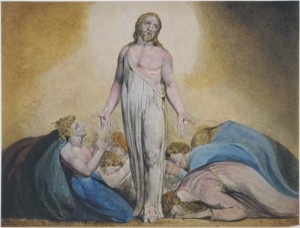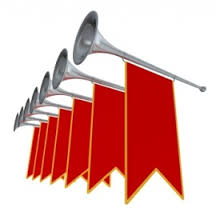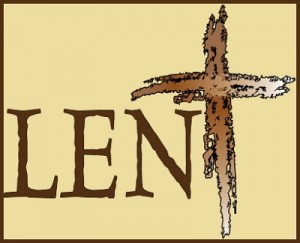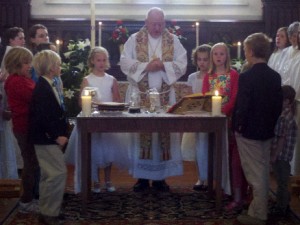====================
This sermon was preached on the Third Sunday of Easter, April 14, 2013, at St. Paul’s Episcopal Church, Medina, Ohio, where Fr. Funston is rector.
(Revised Common Lectionary, Third Sunday of Easter: Acts 9:1-20; Psalm 30; Revelation 5:11-14; and John 21:1-19. These lessons can be read at The Lectionary Page.)
====================
 Several years ago, shortly after my mother died, my step-dad’s business partner also passed away leaving my step-dad to run the business they had created together. Now it is no insult to my step-dad, Stan, who had never before been a business owner, to say that he knew little or nothing about running a business. He’d been a tool-and-die man most of his working life with a brief foray into sales, but he’d never been in the “front office” and he’d certainly never been a manager or executive of any sort. Stan didn’t know accounts receivable from fish, and inventory control was a foreign language to him.
Several years ago, shortly after my mother died, my step-dad’s business partner also passed away leaving my step-dad to run the business they had created together. Now it is no insult to my step-dad, Stan, who had never before been a business owner, to say that he knew little or nothing about running a business. He’d been a tool-and-die man most of his working life with a brief foray into sales, but he’d never been in the “front office” and he’d certainly never been a manager or executive of any sort. Stan didn’t know accounts receivable from fish, and inventory control was a foreign language to him.
So I took a leave of absence from the parish where I was then rector, left Evie and the kids on their own in Kansas, moved in with my step-dad in Costa Mesa, California, and became the de facto president and chief executive officer of Halogen Valve Systems. The company had been created to manufacture and market an emergency chlorine valve actuator for municipal water systems, a product my step-dad and his partner had invented and patented. I knew nothing about chlorine, water systems, or valves, but I did know computers, accounting, and business management, so I dove right in to the job, searching through computer files, finding blueprints and parts lists, learning supplier names and product numbers, customer contacts, and so forth; contacting suppliers and customers; charting supply and distribution patterns; organizing the warehouse, the manufacturing shop, and the front office. In the meantime, Stan taught me about chlorine gas and water purification and emergency valve actuators.
After a couple of months, I had the business pretty well systematized and was ready to turn it back to my step-dad and an office manager, so it came time to show my step-dad what I’d set up and teach him what he needed to know. We’d sit down in my office together and, at each session, we’d spend about an hour going over some aspect of the management plan. Our time was limited to an hour because each time, at just about the hour mark, Stan would stand up and say, “I’m going out to the shop.” And off he’d go, out to the manufacturing floor to work with the guys who were building the valve actuators. What he was doing is exactly what Peter does in today’s gospel lesson from John.
Stan could only take so much management talk, so much double-entry bookkeeping, so much inventory control . . . at some point, at that hour limit, he was filled up. He needed to do something with which he was familiar, to give his brain and his spirit time to process all the confusion of front office management. He was going back to the part of the business he could understand. Peter does the same thing in today’s gospel lesson. He’s taken as much confusion as he can stand. All the glory and wonder at the beginning of Holy Week, all the terror and sadness of Good Friday, all the bewilderment and relief and joy of Easter Sunday . . . it’s all been just about more than he can take and it’s time to do something he can understand. “I’m going fishing,” he says. “I’m going back to the part of this business I understand.” And the others know exactly how he feels and they chime in with, “We’ll join you.”
So off they go and as they are fishing, a figure appears on the beach and calls to them. It’s Jesus, who gives them some advice about fishing and then invites them to a grilled fish breakfast he is preparing. While they are eating, he and Peter engage in a conversation, but before we get into that, let’s take a look at the other major story of this morning.
Our Lectionary also gives us the story of St. Paul’s conversion in today’s reading from the Book of Acts. It’s a familiar enough story for us here at St. Paul’s Parish. We hear it at least twice a year, and now the Lectionary gives it to us a third time. Saul of Tarsus, a Jew among Jews, a Pharisee among Pharisees, a prosecutor of the heretics who proclaim this upstart rabbi Jesus to be the Messiah, is on his way to Damascus with letters of warrant from the chief priests to arrest and prosecute any Christians he finds there. Along the road, however, he is knocked on his butt, literally knocked off his horse by a blinding light and a crash of thunder and a voice which asks, “Saul, why are you persecuting me?” In surprise, he asks the voice who it is that is speaking and he is told, “I am Jesus!” And Saul and Jesus have a conversation.
Saul’s conversation with Jesus is rather abrupt. Jesus simply tells him to get up and go to a certain place in Damascus and there he will be instructed. Peter’s conversation is rather different. Three times Jesus asks him “Do you love me?” Three times Peter answers, “You know I do.” Three times Jesus tells Peter to take care of Jesus’ sheep.
When we read this in English, we miss a very important nuance in John’s use of language and we are apt to miss John’s point. The first two times Jesus asks Peter, “Do you love me?” John uses the word agape to render the question. This word is normally used in the Greek scriptures to describe perfect or “divine” love. When Peter answers Jesus in the affirmative, he uses another word, phileo, which means “brotherly love.” This suggests that he loved Jesus as a brother, not yet fully understanding his Risen Lord’s divinity. Jesus then calls Peter to feed the lambs. Jesus asks the second time, again using “agape.” Jesus at first had not gotten the answer from Peter that he wanted but, again, Jesus receives the same response from Peter. Jesus then repeats the feeding admonition, changing it so that Peter is responsible for feeding the not just the lambs, but the whole flock. The third time, Jesus changes the word and asks Peter the question in Peter’s own terms; Jesus uses the disciple’s “brotherly love” word, phileo.
What is happening in this conversation, indeed with this whole scene, is that Jesus is meeting Peter where Peter can meet Jesus. Peter had to get out of Jerusalem; he had to get to someplace, to doing something, that he could grasp. So Jesus met him there. Peter couldn’t quite yet understand Jesus’ godliness, using a term for human rather than divine love. So Jesus went along with him. Jesus met and interacted with Peter is a manner appropriate to Peter’s situation. Jesus does the same with Saul.
Saul was a fire-brand, a person who so aggressively and energetically promoted his own cause, his own understanding of religion that he encouraged unrest among Jews and kindled strife for the followers of Jesus. And Jesus did with him what he had done with Peter. He came to him in the place and in the manner in which Saul could be reached and led to understand. Saul clearly had heard the gospel message preached by the disciples; he’d heard it and rejected it. The soft and gentle approach hadn’t worked. So, in the alternative, Jesus came to him with flash of light and a clap of thunder, and knocked him on his butt!
The two stories from Scripture today teach us the same lesson. Jesus comes to us when and where and as we are able to understand and appreciate him, gently to some, more aggressively to others. But however he comes, he comes. We call this “grace.” Simply put, grace is the free and unmerited favor manifesting our salvation and bestowing blessings upon us. Both Peter and Paul received this grace in ways appropriate to them, as do we all.
Earlier this week an author named Brennan Manning passed away. Brennan was an American Roman Catholic, a friar, a priest (who had married!), a contemplative, and a frequent speaker at religious events. He lived a fascinating and turbulent life, and wrote many books, one of which was The Ragamuffin Gospel. In it, he wrote this about grace:
Because salvation is by grace through faith, I believe that among the countless number of people standing in front of the throne and in front of the Lamb, dressed in white robes and holding palms in their hands (see Revelation 7:9), I shall see the prostitute from the Kit-Kat Ranch in Carson City, Nevada, who tearfully told me that she could find no other employment to support her two-year-old son. I shall see the woman who had an abortion and is haunted by guilt and remorse but did the best she could faced with grueling alternatives; the businessman besieged with debt who sold his integrity in a series of desperate transactions; the insecure clergyman addicted to being liked, who never challenged his people from the pulpit and longed for unconditional love; the sexually abused teen molested by his father and now selling his body on the street, who, as he falls asleep each night after his last “trick,” whispers the name of the unknown God he learned about in Sunday school.
“But how?” we ask.
Then the voice says, “They have washed their robes and have made them white in the blood of the Lamb.”
There they are. There we are — the multitude who so wanted to be faithful, who at times got defeated, soiled by life, and bested by trials, wearing the bloodied garments of life’s tribulations, but through it all clung to faith.
My friends, if this is not good news to you, you have never understood the gospel of grace. (The Ragamuffin Gospel: Good News for the Bedraggled, Beat-Up, and Burnt Out)
The stories of Peter fishing on the Sea of Galilee and of Saul traveling to Damascus, and of their encounters with Jesus in those places, teach us that Jesus comes to us wherever and however we are, even defeated, soiled, and bloodied, to give us salvation and blessing, to give us the unmerited favor of God, to give us grace. We may have gone out to the manufacturing floor; we may have gone fishing; we may be on a trip pursuing our passion. Wherever we are, Jesus meets us, and there we find grace. Amen.
====================
A request to my readers: I’m trying to build the readership of this blog and I’d very much appreciate your help in doing so. If you find something here that is of value, please share it with others. If you are on Facebook, “like” the posts on your page so others can see them. If you are following me on Twitter, please “retweet” the notices of these meditations. If you have a blog of your own, please include mine in your links (a favor I will gladly reciprocate). Many thanks!
====================
Father Funston is the rector of St. Paul’s Episcopal Church, Medina, Ohio.
 Leslie Dixon Weatherhead (1893-1976) was an English Methodist Minister who served at the City Temple, a Congregational Church in London. He served there from 1936 until his retirement in 1960. In one of his several book, The Christian Agnostic, he wrote, “When people said to me, ‘I should like to be a member of the City Temple, what must I believe?’ I used to say, ‘Only those things which appear to you to be true.’”
Leslie Dixon Weatherhead (1893-1976) was an English Methodist Minister who served at the City Temple, a Congregational Church in London. He served there from 1936 until his retirement in 1960. In one of his several book, The Christian Agnostic, he wrote, “When people said to me, ‘I should like to be a member of the City Temple, what must I believe?’ I used to say, ‘Only those things which appear to you to be true.’”
 St. Paul wrote some great stuff. He’s treatise on love in the thirteenth chapter of the first letter to the church in Corinth is brilliant! He wrote (or, at least, is blamed for) some incredibly stupid stuff, too: telling women to be silent in the very next chapter of First Corinthians, for example, or sending Onesimus back to Philemon without clearly denouncing the institution of slavery.
St. Paul wrote some great stuff. He’s treatise on love in the thirteenth chapter of the first letter to the church in Corinth is brilliant! He wrote (or, at least, is blamed for) some incredibly stupid stuff, too: telling women to be silent in the very next chapter of First Corinthians, for example, or sending Onesimus back to Philemon without clearly denouncing the institution of slavery.  The picture on the front of the bulletin today is one I found on the internet several months ago and which I just found intriguing. I can’t recall what I was doing or reading or searching for when I ran across it, but it grabbed my attention and seemed to me to be a great illustration for baptism and the baptismal covenant set out in The Book of Common Prayer.
The picture on the front of the bulletin today is one I found on the internet several months ago and which I just found intriguing. I can’t recall what I was doing or reading or searching for when I ran across it, but it grabbed my attention and seemed to me to be a great illustration for baptism and the baptismal covenant set out in The Book of Common Prayer. Some years ago, during the summer of 2000 to be exact, I was one of about a dozen adults who chaperoned 87 teenagers on a ten-day tour of northern Italy. One of the pieces of advice given our group by the organizing tour guide was that the young ladies would not be allowed into Italian cathedrals wearing shorts or tank-tops. She suggested that they take with them, and always have on hand a light-weight over-blouse and a large scarf that they could tie around their waist to form a sort of skirt. This caused no amount of amusement among our group 17- and 18-year-old, Twenty-First Century, American girls, but it only took one time being escorted out of a church by a stern Italian nun for them to realize how serious the advice was and to never again forget to put on their overshirts and their wrap-around skirts.
Some years ago, during the summer of 2000 to be exact, I was one of about a dozen adults who chaperoned 87 teenagers on a ten-day tour of northern Italy. One of the pieces of advice given our group by the organizing tour guide was that the young ladies would not be allowed into Italian cathedrals wearing shorts or tank-tops. She suggested that they take with them, and always have on hand a light-weight over-blouse and a large scarf that they could tie around their waist to form a sort of skirt. This caused no amount of amusement among our group 17- and 18-year-old, Twenty-First Century, American girls, but it only took one time being escorted out of a church by a stern Italian nun for them to realize how serious the advice was and to never again forget to put on their overshirts and their wrap-around skirts.  Several years ago – 33 to be exact – Bruce Dern starred in a little-remarked movie entitled Middle Age Crazy; it dealt with the main character’s midlife crisis of turning 40 years of age.
Several years ago – 33 to be exact – Bruce Dern starred in a little-remarked movie entitled Middle Age Crazy; it dealt with the main character’s midlife crisis of turning 40 years of age.  In The Book of Common Prayer on page 264 you’ll find the beginning of the liturgy for Ash Wednesday. If you were here on that day which marks the beginning of this season we call Lent, or in another church to be marked on your forehead with the cross of ashes, to be reminded of your mortality with the familiar words, “Remember you are dust, and to dust you will return,” you will also have heard the Lenten admonition which the presiding priest reads at each Ash Wednesday service. It begins at the bottom of that page and comes in the service after the reading of the lessons of the day and the preaching of the sermon.
In The Book of Common Prayer on page 264 you’ll find the beginning of the liturgy for Ash Wednesday. If you were here on that day which marks the beginning of this season we call Lent, or in another church to be marked on your forehead with the cross of ashes, to be reminded of your mortality with the familiar words, “Remember you are dust, and to dust you will return,” you will also have heard the Lenten admonition which the presiding priest reads at each Ash Wednesday service. It begins at the bottom of that page and comes in the service after the reading of the lessons of the day and the preaching of the sermon. More than thirty years ago, a bishop named Wesley Frensdorff set out his vision for the church in a piece of writing he title simply The Dream. Wes Frensdorff was a good friend to Evelyn and to me. He was her parish priest when she was a child, and her boss when she was the director of the Diocese of Nevada’s summer camp. He officiated at our wedding, and is the person who spoke for God and hounded me into eventually becoming a clergyman. As my Rector’s Report, I’d like to share his dream with you, adding my own brief comments as to how I see this church meeting his vision.
More than thirty years ago, a bishop named Wesley Frensdorff set out his vision for the church in a piece of writing he title simply The Dream. Wes Frensdorff was a good friend to Evelyn and to me. He was her parish priest when she was a child, and her boss when she was the director of the Diocese of Nevada’s summer camp. He officiated at our wedding, and is the person who spoke for God and hounded me into eventually becoming a clergyman. As my Rector’s Report, I’d like to share his dream with you, adding my own brief comments as to how I see this church meeting his vision.

